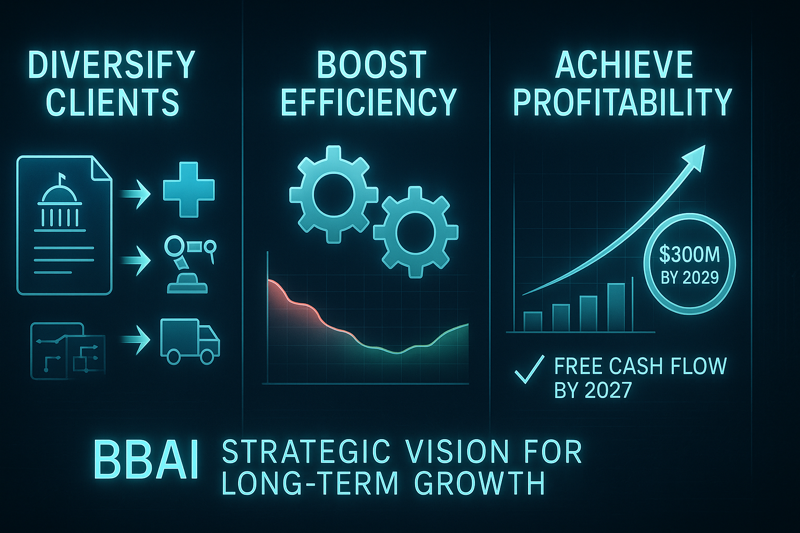BigBear AI Soars: Did You Miss the Boat? Discover If You Should Buy BBAI Stock After Its Explosive Rise
The BBAI Stock Enigma: Is This Your Last Chance to Profit from the AI Defense Boom?
BigBear.ai (BBAI): Navigating the AI Defense Landscape – A Deep Dive for Investors
In the rapidly evolving world of artificial intelligence, where innovation meets national security, BigBear.ai (NYSE: BBAI) has emerged as a fascinating, albeit complex, contender. Often drawing comparisons to industry giant Palantir (NYSE: PLTR), BBAI stock positions itself as an AI-driven decision intelligence company, primarily serving the U.S. government and increasingly, commercial enterprises. For financial and investment blog readers, understanding BBAI stock requires a comprehensive look beyond the headlines – examining its unique business model, the influential figures at its helm, its intricate financial landscape, and the inherent risks and rewards of this highly speculative stock.
Company Overview and Core Business: Powering Decisions with AI
BigBear.ai’s mission statement, prominently featured on its website, encapsulates its core purpose: “Ready AI for… and ensure national security and secondly, strengthen critical infrastructure.” This succinct declaration highlights its dual focus: leveraging Artificial Intelligence (AI) to bolster governmental defense and intelligence capabilities, and extending these transformative AI solutions to fortify vital commercial sectors.
At its heart, BBAI is an “AI-driven decision intelligence” company. This means it harnesses advanced AI technologies to dissect vast, complex datasets, providing its clients with actionable insights to make informed, strategic decisions. Its services are designed to address a wide array of critical needs, including:
- Predicting Risks: Identifying potential threats and vulnerabilities before they materialize, crucial for both national security and commercial operations.
- Simulating Battlefield Scenarios: Aiding defense agencies in planning and optimizing military strategies by simulating various combat outcomes.
- Allocating Resources Optimally: Helping organizations, particularly government entities, distribute resources effectively to maximize efficiency and impact.
- Improving Operational Efficiency: Streamlining processes and enhancing productivity across diverse industries through data-driven recommendations.
BBAI’s business model is fundamentally B2B (business-to-business). It targets organizations that may not yet possess the internal capabilities to fully integrate AI into their operations. The company steps in to perform in-depth data analysis, develop tailored AI models, and build the necessary infrastructure to embed AI seamlessly into client workflows.
Key Service Areas:
- National Security and Critical Infrastructure: This segment constitutes the bedrock of BBAI’s operations. The company works extensively with federal government entities, including the Department of Defense (DoD), Department of Homeland Security (DHS), Air Force, and NASA. Its contributions span critical areas such as defense, intelligence gathering, and border security, providing AI-powered insights for mission-critical decision-making.
- Commercial Applications: While government contracts remain its primary revenue driver, BBAI is actively expanding its footprint in commercial sectors. Its AI solutions find applications in:
- Transportation: Optimizing logistics and supply chain management.
- Trade: Enhancing efficiency and risk assessment in global commerce.
- Manufacturing: Improving production systems, resource management, and warehouse operations through AI-driven optimization.
- Healthcare: Exploring expansion into the medical field by applying AI to analyze patient data, predict disease outbreaks, and optimize treatment plans.
- Academia: Providing PR model simulation software for research and educational purposes.
Despite its diversified commercial ventures, the company candidly acknowledges that “currently, the largest customers still come from the government.” This strong reliance on the public sector is both a strength and a potential vulnerability, as discussed later.
A recent, significant win that underscores BBAI’s competitive advantage in the government space is a “new contract for the Department of Defense’s Critical Force Management Platform.” This “3.5-year exclusive contract valued at 133 million US dollars” is a testament to its ability to secure lucrative, sole-source agreements – a characteristic that draws direct parallels to Palantir’s success in obtaining similar exclusive government mandates. Such contracts are highly prized for their stability and long-term revenue potential.
Leadership and Strategic Advantages: The Government Nexus
The leadership team at BigBear.ai is a pivotal factor in its market appeal and perceived strategic advantage, particularly due to their deep-seated connections within the U.S. government.
- Kevin McAleenan (CEO): The appointment of Kevin McAleenan as CEO is a significant highlight and a key differentiator for BBAI. McAleenan brings “nearly 20 years of leadership experience in the U.S. government,” a background that directly aligns with the company’s core business. His impressive resume includes being the “first civilian appointed as Commissioner of U.S. Customs and Border Protection in 2018.” More notably, he served as “Acting Secretary of the U.S. Department of Homeland Security under President Donald Trump.” This direct link to a former presidential administration and extensive experience within the highest echelons of government is considered a tremendous asset. It is widely believed that McAleenan extensive network and understanding of government procurement processes are instrumental in BBAI’s ability to secure highly sought-after government contracts. As the briefing emphasizes, “This type of CEO, as long as his network connections are there and he can secure contracts from the government, this company has hope.”
- Carl Napoletano – Chief Operating Officer (COO): The COO’s background further reinforces BBAI’s strategic positioning within the defense sector. Prior to joining BigBear.ai, the COO “led the Department of Defense in developing mission-critical decision solutions.” This experience demonstrates a profound understanding of the technological requirements and operational intricacies of government defense initiatives.
The synergistic combination of a CEO with unparalleled government ties (especially to the previous administration, which can translate into continued influence and access) and a COO with a proven track record in developing defense technology provides BigBear.ai with a distinct competitive edge. This leadership structure is a primary reason why many investors express “a lot of confidence in this company,” believing it holds the key to unlocking lucrative and stable government revenue streams. The ability to navigate the complex landscape of government contracting is a barrier to entry for many, and BBAI’s leadership clearly possesses this invaluable expertise.
Financial Performance and Valuation: A Mixed Bag
BigBear.ai’s financial performance presents a nuanced picture, characterized by growth, but also by significant challenges, especially when juxtaposed against its frequently cited peer, Palantir.
- Revenue: The company’s latest reported quarterly revenue stands at “$34.8 million,” representing a “5% year-over-year increase.” While this indicates stable growth, it’s considered “relatively small compared to its market capitalization,” suggesting that its valuation might be outstripping its current revenue generation.
- Profitability: BBAI is currently in a “loss-making stage.” Its latest quarterly net loss was “$62 million.” While seemingly an improvement from the “$127.8 million” loss in the prior year, it’s crucial to understand the underlying figures. The previous year’s loss included a substantial one-time “goodwill impairment of $85 million.” Excluding this non-recurring charge, the “real net loss” in the prior year was approximately “$42.8 million.” This means that the “this quarter’s loss of $62 million is actually a larger loss,” indicating a deterioration in underlying profitability. Similarly, its adjusted EBITDA “expanded to negative $7 million” from negative $1.6 million year-over-year, further signaling a decline in operational efficiency.
- Reasons for Increased Losses: The company attributes these increased losses primarily to “delays in government projects.” These delays have resulted in “idle resources and costs,” directly impacting BBAI’s bottom line. This explanation underscores a critical vulnerability: BBAI’s “over-reliance on government orders,” which are often subject to unpredictable funding cycles and bureaucratic slowdowns.
- Order Backlog: A ray of optimism comes from BBAI’s “unfulfilled orders,” which reached “$385 million” by the end of Q1 2025, a robust “30% increase” from Q1 2024. This substantial backlog suggests a strong pipeline for future revenue growth. However, a significant caveat remains: “whether these backlog orders can be smoothly converted into actual revenue is still a question mark.” The unpredictable nature of government project execution, often characterized by lengthy approval processes and potential scope changes, introduces a degree of uncertainty into the realization of this revenue.
- Cash Position: As of Q1 2025, BBAI held “$108 million in cash,” an increase from “$50 million” at the end of 2024. While an increase in cash reserves is generally positive, the source clarifies that this cash “was not earned through operations but raised through financing from investors.” This critical detail highlights that the company “currently does not have the ability to generate its own cash flow” and “needs to continuously seek money from investors to maintain operations.” This dependency on external capital raises concerns about long-term financial sustainability and potential future equity dilution. Financial profitability is projected to be “one or two years away,” indicating a prolonged period of cash burn.
Valuation and Comparison to Palantir (PLTR):
The market frequently hails BBAI stock as “the next PLTR,” largely due to their shared focus on AI-driven decision intelligence for government clients. However, a direct comparison reveals significant disparities that challenge this narrative:
- Revenue Scale: The sheer difference in scale is striking. PLTR’s “projected revenue for this year exceeds $3 billion,” a staggering figure compared to BBAI’s “just over $130 million.” This massive gap highlights BBAI’s much earlier stage of development and revenue maturity.
- Customer Structure: PLTR has successfully diversified its client base, with “commercial customers already accounting for nearly half of its revenue.” In contrast, BBAI “still primarily relies on the federal government.” This reliance exposes BBAI to greater concentration risk and less diversified revenue streams.
- Profitability: Perhaps the most significant distinction lies in profitability. PLTR “has achieved profitability for several consecutive quarters,” demonstrating a sustainable business model. BBAI, however, “is still in a stage of continuously burning money,” indicating a fundamental difference in financial health and operational efficiency.
- Valuation Discrepancy: While PLTR’s market capitalization is over $200 billion with over $3 billion in revenue, BBAI’s market cap is around $2.25 billion (as of early July 2025) with revenues of approximately $158 million (TTM). Some analyses suggest that, based on revenue, BBAI “is still undervalued” compared to Palantir, given that the market cap difference is much larger than the revenue difference (roughly 30x vs. over 100x). However, this perspective often overlooks the profitability and growth trajectories.
A discounted cash flow (DCF) model, which attempts to estimate intrinsic value based on future cash flows, paints a more cautious picture for BBAI. Assuming the company achieves positive free cash flow by 2027 and reaches $300 million in positive cash flow by 2029, its “intrinsic value is calculated to be around $3.13 per share.” Given its recent market price fluctuations, ranging from approximately $3.9 to $7.75 per share, this suggests BBAI “is currently overvalued.” This implies that the “market has already priced in all its growth expectations for the next five years or more,” leaving limited upside based purely on fundamental projections.
Market Perception and Investment Risks: A High-Wire Act
BigBear.ai is widely recognized as a highly speculative stock, characterized by significant volatility and a unique investment profile.
- Speculative Nature: The company is perceived as adept at “using news to hype up the stock.” Its prominent display of the exclusive Department of Defense contract on its homepage is cited as evidence of its proactive promotional strategies. Investors are cautioned “not to look at its fundamentals” in the traditional sense, as the market’s valuation of companies like Palantir (and by extension, BBAI) is often driven by their ability to secure “exclusive contracts” and the broader AI narrative, rather than immediate profitability. This suggests that BBAI’s stock price is heavily influenced by sentiment and news catalysts.
- High Volatility (Beta): BBAI exhibits a remarkably high “beta value as high as 3.18.” This statistic signifies that its “stock price fluctuations are three times that of the broader market.” Consequently, “it rises quickly when the market is optimistic, but its decline is also sharp.” This extreme volatility makes BBAI an unsuitable candidate for long-term, heavy-position holding for ordinary investors, as it can lead to substantial and rapid capital losses.
- “Hunting Mentality” for Investment: Given its high volatility and the current overvaluation based on a traditional fundamental analysis, investors are advised to adopt a “hunting mentality.” This approach entails “saving bullets” (conserving capital) and patiently waiting for the stock price to drop to a “reasonable level” (potentially around $3-$4 per share, aligning more closely with the intrinsic value derived from the DCF model) before initiating a “small-position entry.” The objective here is to “take a piece of the action and then leave,” rather than holding for prolonged periods of growth. This suggests a trading-oriented strategy rather than a long-term investment.
- Government Dependency Risk: BBAI’s substantial reliance on government contracts introduces significant risks. The company is vulnerable to “budget adjustments or procedural delays” within government agencies. The prevailing trend in the U.S. government of “tightening spending” and “cutting budgets” (driven by efforts to extend tax cuts and reduce overall spending) poses a “huge blow to Big B,” as the U.S. government remains its largest client. Even though AI and defense are considered priority areas, “small and medium-sized contractors like BBAI are often the first to have their orders cut when budgets are limited.” This highlights a significant revenue concentration risk.
- Financial Sustainability: The company’s admitted reliance on external financing to sustain operations means that “if the capital market environment tightens,” BBAI could face critical risks. These include the necessity of “further equity dilution through fundraising” (issuing more shares, which can depress existing share value) or, in a worst-case scenario, “cash depletion.” This reliance on investor capital rather than self-generated cash flow is a major red flag for long-term viability without continuous market support.
Conclusion: A Speculative Play with Potential and Peril
BigBear.ai (BBAI) stands as an intriguing small-cap stock within the burgeoning AI defense sector. Its narrative is undeniably compelling, driven by its cutting-edge AI-powered decision intelligence services and a leadership team boasting exceptionally deep ties within the U.S. government. The company’s demonstrated ability to secure exclusive government contracts, reminiscent of Palantir’s strategic wins, is a significant draw for investors eager to capitalize on the intersection of AI and national security.
However, a meticulous examination of BBAI’s financials reveals a company still navigating its nascent stages of transformation. It grapples with expanding losses, an undeniable heavy reliance on government funding, and an ongoing need for external financing to sustain its operations. While the market buzz often positions BBAI as the potential “next Palantir,” fundamental analysis suggests a more cautious outlook. The intrinsic value estimates imply that its current stock price has already “priced in all its growth expectations for the next five years or more,” leaving limited room for appreciation based on traditional valuation metrics.
For astute investors, BigBear.ai is best approached not as a stable, long-term cornerstone investment, but rather as a high-volatility, speculative play. Its exceptionally high beta value underscores the necessity of rigorous risk management, advocating for small position sizes and a strategic approach to entry and exit points. The ideal scenario for considering an investment in BBAI might involve opportunistic entries during market pullbacks, aiming for a price that aligns more closely with a fundamentally sound valuation.
Ultimately, BBAI’s future trajectory hinges critically on its ability to transcend its current limitations. Key to its sustainable success will be:
- Diversifying its client base beyond government: Reducing its over-reliance on federal contracts will mitigate concentration risk and stabilize revenue streams.
- Improving operational efficiency: Stemming the tide of expanding losses and moving towards a more efficient cost structure is paramount.
- Achieving sustainable profitability: Demonstrating the ability to generate its own cash flow from operations will be the ultimate validation of its business model and a crucial step towards long-term viability.
Until these fundamental improvements materialize, BBAI will remain a stock for the risk-tolerant investor, offering the tantalizing promise of explosive growth but demanding an acute awareness of its inherent financial vulnerabilities and market volatility.
Disclaimer: This article is for educational purposes only and does not constitute investment advice. Investors should conduct their own due diligence before making any financial decisions. We are not responsible for any investment losses incurred based on the information provided in this article.







